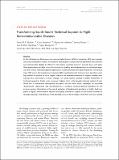| dc.contributor.author | Shakow, Aaron D.A. | |
| dc.contributor.author | Bukhman, Gene | |
| dc.contributor.author | Adebona, Olumuyiwa | |
| dc.contributor.author | Greene, Jeremy | |
| dc.contributor.author | de Dieu Ngirabega, Jean | |
| dc.contributor.author | Binagwaho, Agnes | |
| dc.date.accessioned | 2014-12-01T18:46:26Z | |
| dc.date.available | 2014-12-01T18:46:26Z | |
| dc.date.issued | 2012-04 | |
| dc.identifier.issn | 22118160 | |
| dc.identifier.uri | http://hdl.handle.net/1721.1/91966 | |
| dc.description.abstract | At the UN High-Level Meeting on non-communicable diseases (NCD) in September 2011, each member state was challenged to create a multisectoral national policy and plan for the prevention and control of non-communicable disease by 2013. Few low-income countries, however, currently have such plans. Their governments are likely to turn for assistance in drafting and implementation to multilateral agencies and Contract Technical Support Organizations recommended by development partners. Yet because many NCD seen in the lowest-income countries differ significantly from those prevalent elsewhere, existing providers of external technical support may lack the necessary experience to support strategic planning for NCD interventions in these settings. This article reviews currently available mechanisms of technical support for health sector planning. It places them in the broader historical context of post- World War II international development assistance and the more recent campaigns for horizontal “South-South” cooperation and aid effectiveness. It proposes bilateral technical assistance by low income-countries themselves as the natural evolution of development assistance in health. Such programs, it argues, may be able to improve the quality of technical support to low-income countries for strategic planning in the NCD area while directing resources to the regions where they are most needed. | en_US |
| dc.language.iso | en_US | |
| dc.publisher | Elsevier | en_US |
| dc.relation.isversionof | http://dx.doi.org/10.1016/j.gheart.2012.01.009 | en_US |
| dc.rights | Article is made available in accordance with the publisher's policy and may be subject to US copyright law. Please refer to the publisher's site for terms of use. | en_US |
| dc.source | Elsevier | en_US |
| dc.title | Transforming South–South Technical Support to Fight Noncommunicable Diseases | en_US |
| dc.type | Article | en_US |
| dc.identifier.citation | Shakow, Aaron D.A., Gene Bukhman, Olumuyiwa Adebona, Jeremy Greene, Jean de Dieu Ngirabega, and Agnès Binagwaho. “Transforming South–South Technical Support to Fight Noncommunicable Diseases.” Global Heart 7, no. 1 (March 2012): 35–45. © 2012 World Heart Federation (Geneva) | en_US |
| dc.contributor.department | Massachusetts Institute of Technology. Department of Humanities. History Section | en_US |
| dc.contributor.department | Massachusetts Institute of Technology. School of Humanities, Arts, and Social Sciences | en_US |
| dc.contributor.mitauthor | Shakow, Aaron D.A. | en_US |
| dc.relation.journal | Global Heart | en_US |
| dc.eprint.version | Final published version | en_US |
| dc.type.uri | http://purl.org/eprint/type/JournalArticle | en_US |
| eprint.status | http://purl.org/eprint/status/PeerReviewed | en_US |
| dspace.orderedauthors | Shakow, Aaron D.A.; Bukhman, Gene; Adebona, Olumuyiwa; Greene, Jeremy; de Dieu Ngirabega, Jean; Binagwaho, Agnes | en_US |
| mit.license | PUBLISHER_POLICY | en_US |
| mit.metadata.status | Complete | |
